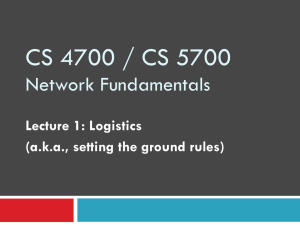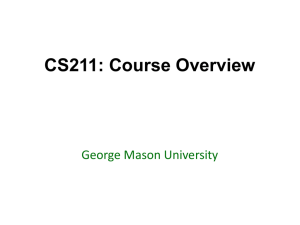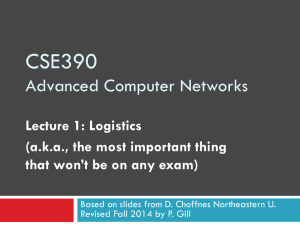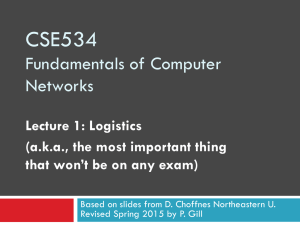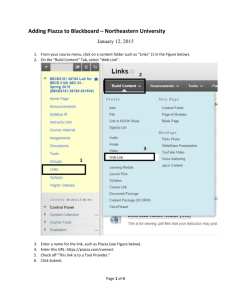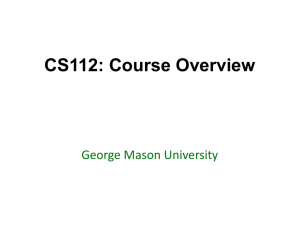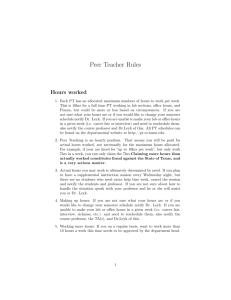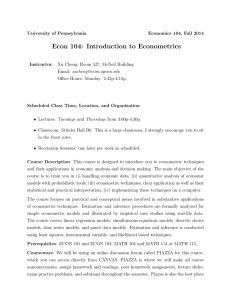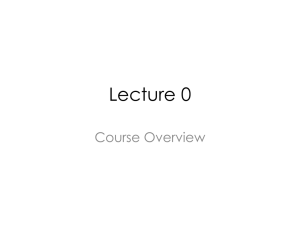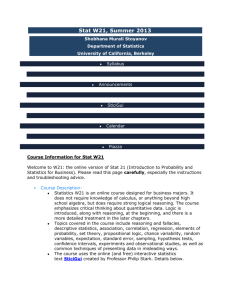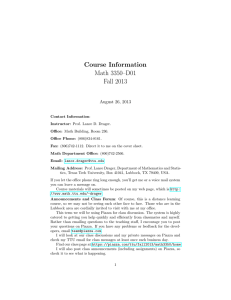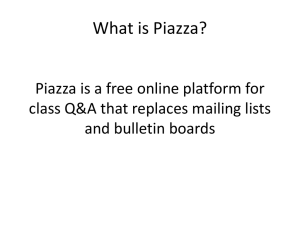Intro - David Choffnes
advertisement
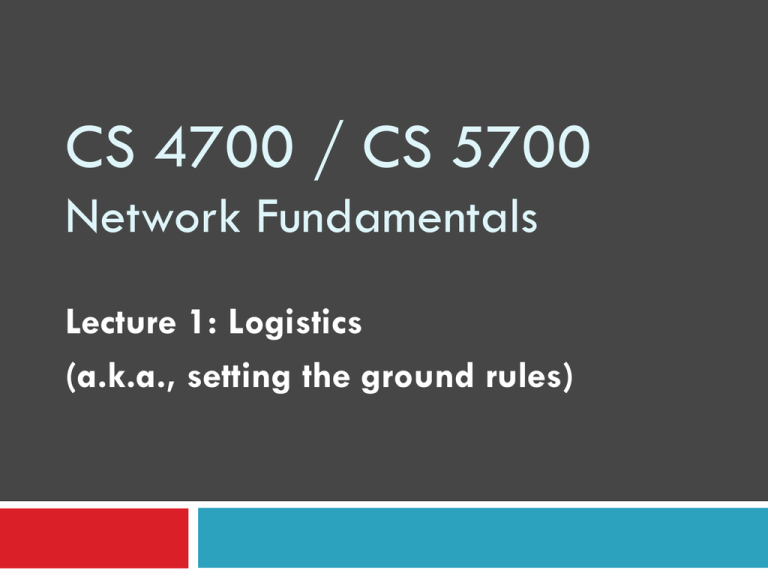
CS 4700 / CS 5700 Network Fundamentals Lecture 1: Logistics (a.k.a., setting the ground rules) Hello! 2 Welcome to CS 4700 / CS 5700 Are you in the right classroom? Okay, good. Who am I? Professor David Choffnes choffnes@ccs.neu.edu West Village H 256 Office Hours: 9am-11am Thursdays (WVH 256) Is it 9am-11am on Thursday? YES: Feel free to interrupt me and come on in NO: Do not interrupt me. Urgent? E-mail the TAs. Personal? E-mail me. Anti-Social Media 3 Don’t friend me on Facebook It’s nothing personal Choffnes on Twitter: @proffnes LinkedIn: I probably won’t add you, so please don’t ask Your TAs 4 Lead TA Jingjing Ren MS TAs Rohit Aswani Harsh Shah Email: cs5700sp15@ccs.neu.edu Office Hours Monday, Friday noon-2pm WVH Lab Area (but check Piazza) Why Take This Course? 5 How many of you have checked your e-mail, FB, text… Today? In the past hour? Since I started talking? Computer networks are ubiquitous 6 Networks touch every part of our daily life Web search Social networking Watching movies Ordering merchandise Wasting time Computer networks are ubiquitous 7 Networking is one of the most critical topics in CS There would be no… Big Data Cloud Apps or Mobile Computing … without networks Other reasons to take the class 8 I’m doing research in this area I love what I do, and love to tell you about it I’m going to integrate both classical and new material Getting a good job Manager of one of Amazon’s core services (think S3, EC2): “Can I take this class?” Akamai Manager: “I think your CDN project should be required each new hire for their first 3 months” Google Manager: “This is really cool.” Goals 9 Fundamental understanding about computer networks All the way from bits on a wire… … across the ever-evolving Internet… … to a distributed applications Focus on software and protocols Not hardware Minimal theory Project-centric, hands on experience Programming APIs Network Simulation Application-level protocols Globally distributed systems Online Resources 10 http://david.choffnes.com/classes/cs4700sp15/ Class forum is on Piazza Sign up today! Install their iPhone/Android app When in doubt, post to Piazza Piazza If Use is preferable to email you e-mail me a question, I will tell you to post it on Piazza folders (homework1, lecture2, project3, etc.) Misnomer 11 “Fundamentals of Computer Networking” It’s true, I cover fundamentals But I’m going to cover much, much more Perspective Core fundamentals are essential for working in an networked world However, what you do with the network is far more interesting than the network itself 12 Jan 12 Intro, History, Network Architecture, Intro to C Sockets Jan 19 No Lecture: MLK Day Jan 26 Physical Layer, Data Link Layer, Bridging Feb 2 Network Layer, Intra-domain Routing Feb 9 Inter-domain Routing Feb 16 No Lecture: President’s Day Feb 23 Transport Layer, Congestion Control Mar 2 DNS, NAT, QoS Mar 9 No class: Spring Break Mar 16 Midterm Mar 23 CDNs, IXPs and DCNs Mar 30 Decentralized Networks (P2P, BitTorrent) Apr 6 Other overlay networks Apr 13 Mobile Networks and New Internet Architectures Apr 20 No class: Thanksgiving break Apr 27 Internet Privacy, Security and Anonymous Communications TBA Final Teaching Style 13 3 hour lectures Breaks every hour… ish. I am a network researcher Things make sense to me that may not make sense to you I talk fast if nobody stops me Solution: ask questions! Seriously, ask questions (interrupting me is OK!) Standing up here in silence is very awkward I will stand here until you answer my questions Help me learn your names Say your name before each question Textbook 14 Computer Networks: A Systems Approach Peterson and Davie 5th Edition Workload 15 Projects (5) 4%, 8%, 12%, 16%, and 20% (respectively) Midterm 15% Final 20% Participation 5% Projects 16 This course is project-centric Designed to give you real networking experience Start early! Seriously, start early! 5 projects Due at 11:59:59pm on Wednesday of specified week Use turn-in scripts to submit your code, documentation, etc. Working code is paramount Project Logistics 17 Languages Project 3 will be in TCL/NS2 You may choose the language for the other projects Code must compile on the CCIS Linux machines Project 1 will be released next week Project questions? Post them on Piazza! Project Groups 18 Projects will be completed in groups of two Unless we have odd numbers… Don’t mix undergrads/grads (different grading scale) Partner selection Pick whoever you want You may switch partners between projects Do not complain to me about your lazy partner Hey, you picked them Can’t find a partner? Post a message on Piazza! Late Policy 19 Each student is given 4 slip days that they can use at any time to extend a deadline You don’t need to ask me, just turn-in stuff late All group members must have unused slip days i.e. if one member has zero slip days left, the whole group is late Assignments are due at 11:59:59, no exceptions 1 second late = 1 hour late = 1 day late 20% off per day late Paper Reading 20 You will read lots of papers in this class Some are classics, foundations of existing networks Others propose newer, more advanced designs List of papers are on the website 2+ papers per week If you have questions about them, ask on Piazza Questions about these papers will be on In-class Exams exercises In Class Participation 22 This is a senior/masters level course I’m not taking attendance …but you will want to show up In-class exercises: Meant to test knowledge of papers, prepare for exams Each lecture, at a fairly random time, I will distribute exercises Points awarded only to students who attend class At least one group will be asked to present their answer This will account for most of the participation grade Exams 23 Midterm and Final 3 hours, midterm in class, final during finals week The final will be cumulative All exams are: Closed book, closed notes, leave the laptop at home If I see a smartphone, I will take it and use it for research Reproducing figures from lectures will earn a 0 Two students with the exact same figure will get a 0 Grade Changes 24 Each student gets two challenges Modeled after NFL system If you ask for a regrade and you are wrong, you lose a challenge When you are out of challenges, you cannot ask for regrading Must come to office hours with the following in writing: 1. 2. Don’t sweat the small stuff Specify the problem(s) you want regraded For each problem, explain why the grade is in error Regrading does not make me a happy Professor If the change is <5% of the grade, don’t bother More details on the website Cheating 25 Do not do it Seriously, don’t make me say it again Cheating is an automatic zero Will be referred to the university for discipline and possible expulsion I’m not kidding: I will send any suspects to OSCCR without exception Project code must be original You and your groupmates only Unless we give you starter code, obviously StackOverflow/Quora are not your friends If you have questions about an online resource, ask us Final Grades 26 At the end of the semester, all of your grades will sum to 100 points Projects Exams Participation 4 + 8 + 12 + 16 + 20 + 15 + 20 + 5 = 100 Final grades are based on a simple scale: A >92, A- 90-92, B+ 87-89, B 83-86, B- 80-82, … I don’t curve grades 27 Questions?
